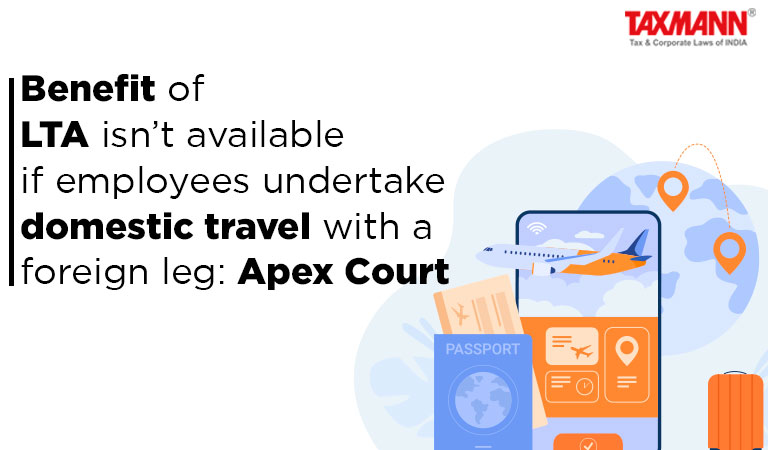Benefit of LTA isn’t available if employees undertake domestic travel with a foreign leg: Apex Court
- Blog|News|Income Tax|
- 2 Min Read
- By Taxmann
- |
- Last Updated on 8 November, 2022

Case Details: State Bank of India v. ACIT - [2022] 144 taxmann.com 131 (SC)
Judiciary and Counsel Details
-
- Uday Umesh Lalit, CJI., S.Ravindra Bhat & Sudhanshu Dhulia, JJ.
Facts of the Case
Assessee-State Bank of India (SBI) was engaged in the banking business. It provided benefits of leave travel concession/allowance (LTA) to its employees while deducting tax from their salary income.
Later, Assessee Officer (AO) observed that employees of the assessee had done their travel not just within India but their journey involved a foreign leg as well. Accordingly, there was violation of statutory provisions. Since the payment made to employees couldn’t be treated as exempt under section 10(5), the assessee ought to have deducted Tax at source, while making this payment.
Thus, AO treated SBI as an assessee-in-default for not deducting TDS under section 192 on the sum paid to employees. The lower authorities upheld the action of AO. The matter was carried to Supreme Court.
Supreme Court Held
The Supreme Court of India has clarified that the basic objective of the LTA Scheme was to familiarize a civil servant or a Government employee to gain some perspective of Indian Culture by traveling in this country.
The main aim of the insertion of LTA was to encourage employees towards tourism in India and because of this reason reimbursement of LTC was exempted. There was no intention of the legislature to allow foreign travel in the garb of LTA available under Section 10(5).
Further, since the assessee was aware of all the travel plans of the employee and had possession of all the bills submitted, this cannot be claimed as a bonafide mistake on the assessee’s part. The assessee had all the relevant material for computing the estimated income of the employees. Thus, the assessee’s appeal was dismissed and the order passed by the lower court was upheld.
Disclaimer: The content/information published on the website is only for general information of the user and shall not be construed as legal advice. While the Taxmann has exercised reasonable efforts to ensure the veracity of information/content published, Taxmann shall be under no liability in any manner whatsoever for incorrect information, if any.

Taxmann Publications has a dedicated in-house Research & Editorial Team. This team consists of a team of Chartered Accountants, Company Secretaries, and Lawyers. This team works under the guidance and supervision of editor-in-chief Mr Rakesh Bhargava.
The Research and Editorial Team is responsible for developing reliable and accurate content for the readers. The team follows the six-sigma approach to achieve the benchmark of zero error in its publications and research platforms. The team ensures that the following publication guidelines are thoroughly followed while developing the content:
- The statutory material is obtained only from the authorized and reliable sources
- All the latest developments in the judicial and legislative fields are covered
- Prepare the analytical write-ups on current, controversial, and important issues to help the readers to understand the concept and its implications
- Every content published by Taxmann is complete, accurate and lucid
- All evidence-based statements are supported with proper reference to Section, Circular No., Notification No. or citations
- The golden rules of grammar, style and consistency are thoroughly followed
- Font and size that’s easy to read and remain consistent across all imprint and digital publications are applied



 CA | CS | CMA
CA | CS | CMA
